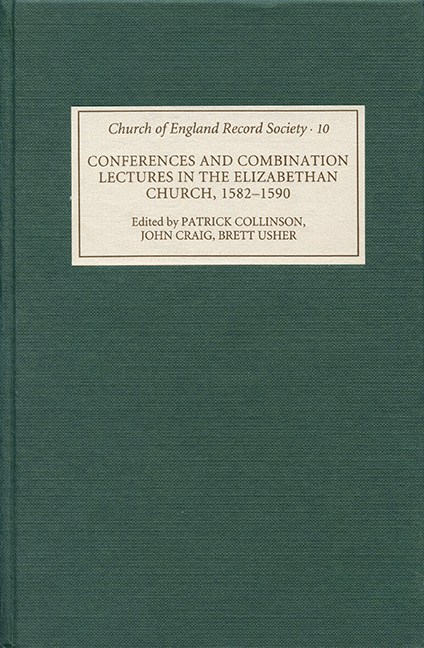Book contents
- Frontmatter
- Contents
- List of illustrations
- Abbreviations
- Dedication
- Preface and acknowledgments
- Introduction
- The Texts
- Biographical Register
- Appendices
- Appendix 1: Dedham grammar school
- Appendix 2: The Dedham lectureship
- Appendix 3: A Sermon preached by Edmund Chapman
- Topical and General Index
- Index of Personal Names
- Index of Place-Names
- Index of Scriptural References
- Index of Classical, Patristic, Medieval and Reformed References
Appendix 2: The Dedham lectureship
Published online by Cambridge University Press: 26 May 2017
- Frontmatter
- Contents
- List of illustrations
- Abbreviations
- Dedication
- Preface and acknowledgments
- Introduction
- The Texts
- Biographical Register
- Appendices
- Appendix 1: Dedham grammar school
- Appendix 2: The Dedham lectureship
- Appendix 3: A Sermon preached by Edmund Chapman
- Topical and General Index
- Index of Personal Names
- Index of Place-Names
- Index of Scriptural References
- Index of Classical, Patristic, Medieval and Reformed References
Summary
Tradition asserts that William Cardinal of Great Bromley, Essex, and East Bergholt, Suffolk, founded the Dedham lectureship in order to create an influential, ‘godly’ base for his brother-in-law, Dr Edmund Chapman. Whilst there is no direct evidence that he actually endowed it, there must be a strong presumption that he laid the economic interstices without which it could not have existed. Perhaps, indeed, it was by guaranteeing Chapman a ‘minimum wage’ during his own lifetime that Cardinal was able to persuade the leading inhabitants of Dedham to support it in perpetuity by voluntary subscription. Thereafter it was maintained by quarterly collections among the inhabitants and administered by a local trust.
Thus matters continued until 1704 when the incumbent lecturer, the distinguished biblical commentator William Burkitt, succeeded in placing it on an endowed footing. He enlisted the support of the archbishop of Canterbury, the bishop of London and other benefactors. With the proceeds he purchased the Lecture House and its grounds, leaving the property at his death as ‘a habitation for all future Lecturers’, and negotiating a trust which thereafter associated the lectureship with the grammar school.
Examining the wills of Dedham and East Bergholt testators between 1560 and 1640, Alan Pennie has suggested that many of the ‘legacies’ – some of them substantial – which were made to Chapman and his successors were not legacies at all. Rather, they directly reflect the obligations of the testators with regard to the contributions they had agreed to make towards the maintenance of the lectureship. In 1596, for example, Thomas Glover left Chapman £10 in yearly instalments of fifty shillings, explaining that he did so ‘in full consideracion of my stipende’. Bequests such as Robert Smith's in 1583 (£8 at the rate of four nobles a year) and Henry Sherman's in 1610 to Chapman's successor, John Rogers (£8 at forty shillings a year), ‘appear to have been similar continuations of the testator's annual payment towards the maintenance of the lecturer for a period of four to six years’. It was far more usual, however, to bequeath him a lump sum. Forty-nine out of fifty-six testators did so, three leaving ten shillings, nineteen of them twenty shillings and the remainder sums ranging from forty shillings up to £10.3
- Type
- Chapter
- Information
- Publisher: Boydell & BrewerPrint publication year: 2003



